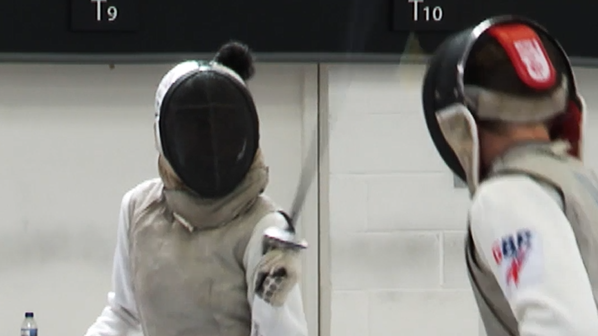03:17

It looks fairly unassuming when we first approach – a small factory in an industrial estate in North London. But inside these walls is a name that's something of an institution in the world of fencing.
Leon Paul is a UK-based company that has been making equipment used at the highest level of fencing since 1921. It recently signed a deal to roll out its products in China, which is quickly becoming a major market for a sport that has featured at every Olympics since the inaugural modern Games began, in Athens in 1896.
"Originally, the Chinese market was just looking at locally produced products, which were probably lower-cost as they didn't have to import them," says Ben Paul, whose great-grandfather Leon founded the firm almost 100 years ago; it is still family-owned, four generations later. "But as people have become better at the sport, they're looking for the very best quality, high-end equipment that we make here in London."
The deal will see Leon Paul's equipment sold through one of China's largest fencing clubs, Vango, and comes after several years of research. "It could add maybe £2 million [$2.6 million] in revenue to our business," says Paul. "We currently turn over around 6 million [GBP], so it's a big, big increase for us."
Sword-fighting has been around for thousands of years, but modern fencing is thought to have originated in Spain around the 16th century. And its popularity is rising rapidly in China. The Chinese Fencing Association had 34,000 members in 2018, with registrations up by almost a third on the previous year.

Ben Paul at the family-run fencing-goods factory bearing his great-grandfather's name (Credit: CGTN)
Ben Paul at the family-run fencing-goods factory bearing his great-grandfather's name (Credit: CGTN)
Boya Wang, who now lives and trains in the UK, has closely followed the sport's rise back home. He first took up fencing almost a decade ago, shortly after the 2008 Beijing Olympics - which he thinks was a key factor in raising fencing's profile.
"I think it's mainly because China did rather well in the Beijing Olympics," he explains. "China also got several medals at the London Olympics and the World Championships, so fencing is becoming another popular sport in China, especially in the Chinese mainland."

Boya Wang talks to CGTN's Nawied Jabarkhyl (Credit: CGTN)
Boya Wang talks to CGTN's Nawied Jabarkhyl (Credit: CGTN)
Wang thinks the popularity of the sport will initially be limited to major urban areas in China like Beijing or Shanghai. And with swords averaging around $100 at Leon Paul, prices could be restrictive too.
But for the London firm – which produces everything for a fencer from swords to masks and clothing – the opportunity to export to China is one it has coveted for years. And with Brexit uncertainty weighing on UK manufacturing, it is a deal that could be a sign of things to come as British exporters look for new markets outside the European Union. Few of those appear as important as China.